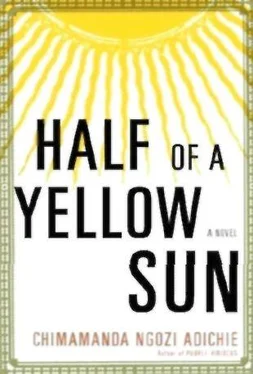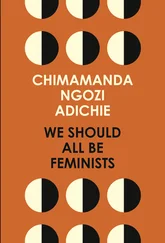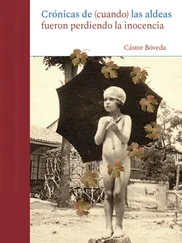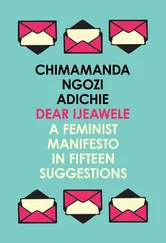In the evenings, Olanna and Kainene walked home together. They talked about the people at the camp, about their school days at Heath-grove, about their parents, about Odenigbo.
"Have you asked him again about that Asaba woman?" Kainene said.
"Not yet."
"Before you ask him, just walk up to him and slap his face. If he dares to slap you back, I will come at him with Harrison 's kitchen knife. But the slap will shake the truth out of him."
Olanna laughed and noticed that they were both walking at a leisurely pace and that their steps were in harmony, their slippers coated in brown dust.
"Grandpapa used to say that it gets worse and then it gets better. O dikata njo, o dikwa mma" Kainene said.
"I remember."
"The world will turn around soon, and Nigeria will stop this," Kainene said quietly. "We'll win."
"Yes." Olanna believed it more because Kainene said it.
There were evenings when Kainene was distant, immersed in herself. Once she said, "I never really noticed Ikejide," and Olanna placed an arm on her sister's shoulder and said nothing. Mostly, though, Kainene was in high spirits and they would sit outside and talk and listen to the radio and to the bats flying around the cashew trees. Sometimes Richard joined them. Odenigbo never did.
Then, one evening, it rained, a flinty blustery rain, a strange shower in the dry season, and perhaps it was why Odenigbo did not go to the bar. It was the evening that he finally accepted Richard's brandy, holding it to his nose and inhaling deeply before he drank, he and Richard still saying very little to each other. And it was the evening that Dr. Nwala came to tell them that Okeoma had been killed. Lightning flashed across the sky and thunder rumbled and Kainene said, laughing, "It sounds like shelling."
"I'm worried that they have not bombed us in a while," Olanna said. "I wonder what they are planning."
"Perhaps an atomic bomb," Kainene said.
They heard the car drive in then and Kainene stood up. "Who is visiting in this kind of weather at night?"
She opened the door and Dr. Nwala came in, water dripping down his face. Olanna recalled how he had extended his hand to help her up after the air raid on her wedding day, how he had said that her dress would get dirty-as though it were not already dirty from lying on the ground. He was thinner and lankier than she remembered and looked as though he would break in two if he sat down abruptly. He did not sit down. He did not waste time with greetings. He had raised his loose shirt away from his body, was rapidly flipping it to get the water off when he said, "Okeoma has gone, ojebego. They were on a mission to retake Umuahia when it happened. I saw him last month, and he told me he was writing some poems and Olanna was his muse, and if anything happened to him I should make sure the poems went to her. But I can't find them. The people who brought the message said that they never saw him writing anything. So I said I would come and tell you he has gone but I did not find the poems."
Olanna was nodding without quite understanding because Dr. Nwala was saying too many words too quickly. Then she stopped. He meant that Okeoma was dead. It was raining in harmattan and Okeoma was dead.
"Okeoma?" Odenigbo spoke in a cracked whisper. "Onye? Are you talking about Okeoma?"
Olanna reached out and grasped Odenigbo's arm and the screams came out of her, screeching, piercing screams, because something in her head was stretched taut. Because she felt attacked, relentlessly clobbered, by loss. She did not let go of his arm until Dr. Nwala stumbled back into the rain, until they climbed silently onto their mattress on the floor. When he slid into her, she thought how different he felt, lighter and narrower, on top of her. He was still, so still she thrashed around and pulled at his hips. But he did not move. Then he began to thrust and her pleasure multiplied, sharpened on stone so that each tiny spark became a pleasure all its own. She heard herself crying, her sobbing louder and louder until Baby stirred and he placed his palm against her mouth. He was crying too; she felt the tears drop on her body before she saw them on his face.
Later, he propped himself on his elbow and watched her. "You're so strong, nkem."
Those were words she had never heard from him. He looked old; there was a wetness in his eyes, a crumpled defeat in his face, that made him look older. She wanted to ask him why he had said that, what he meant, but she didn't and she was not sure who fell asleep first. The next morning, she woke up too early, smelling her own bad breath and feeling a sad and unsettling peace.
Ugwu wanted to die,at first. It was not because of the hot tingle in his head or the stickiness of blood on his back or the pain in his buttocks or the way he gasped for air, but because of his thirst. His throat was scorched. The infantrymen carrying him were talking about how rescuing him had given them a reason to run away, how their bullets had finished and they had sent for reinforcements and nothing was forthcoming and the vandals were advancing. But Ugwu's thirst clogged his ears and muffled their words. He was on their shoulders, bandaged with their shirts, the pain shooting all over his body as they walked. He gulped for air, gasped, and sucked but somehow he could not get enough. His thirst nauseated him.
"Water, please," he croaked. They would not give him any; if he had the energy, he would invoke all the curses he knew on them. If he had a gun he would have shot them all and then shot himself.
Now, in the hospital where they had left him, he no longer wanted to die, but he feared he would; there were so many bodies littered around him, on mats, on mattresses, on the bare floor. There was so much blood everywhere. He heard the sharp screams of men when the doctor examined them and knew that his was not the worst case, even as he felt his own blood seeping out, first warm and then clammy cold against his side. The blood took his will; he was too exhausted to do anything about it and when the nurses hurried past him and left his bandaging unchanged, he did not call out to them. He said nothing, either, when they came and pushed him to his side and gave him quick unceremonious injections. In his delirious moments, he saw Eberechi wearing her tight skirt and making gestures to him that he could not understand. And in his lucid moments, death occupied him. He tried to visualize a heaven, a God seated on a throne, but could not. Yet the alternative vision, that death was nothing but an endless silence, seemed unlikely. There was a part of him that dreamed, and he was not sure if that part could ever retreat into an interminable silence. Death would be a complete knowingness, but what frightened him was this: not knowing beforehand what it was he would know.
In the evenings, in the dim half-light, the people from Caritas came, a priest and two helpers carrying kerosene lanterns, giving out milk and sugar to the soldiers, asking their names and where they had come from.
"Nsukka," Ugwu said, when he was asked. He thought the priest's voice was vaguely familiar, but then everything was vaguely familiar here: The blood of the man next to him smelled like his, the nurse who placed a bowl of thin akamu next to him smiled like Eberechi.
"Nsukka? What is your name?" the priest asked.
Ugwu struggled to focus on the rounded face, the glasses, the browned collar. It was Father Damian. "I am Ugwu. I used to come with my madam Olanna to St. Vincent de Paul."
"Ah!" Father Damian squeezed his hand and Ugwu winced. "You fought for the cause? Where were you wounded? What have they done for you?"
Ugwu shook his head. One part of his buttocks was wrapped in fiery red pain; it consumed him. Father Damian spooned some powdered milk into his mouth and then placed a bag of sugar and milk next to him.
Читать дальше












